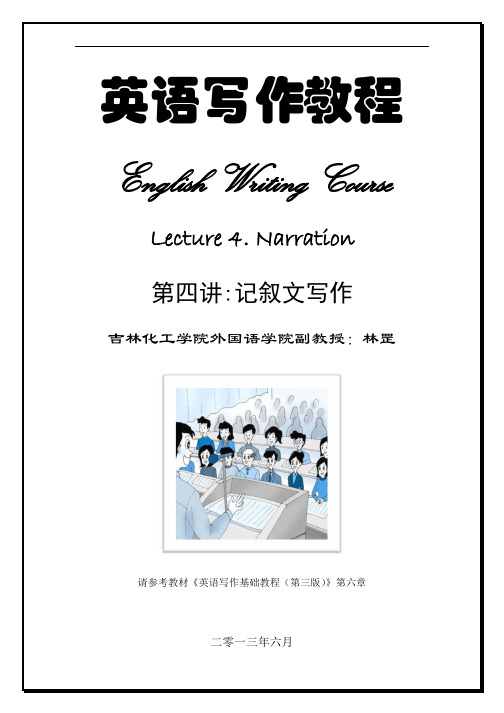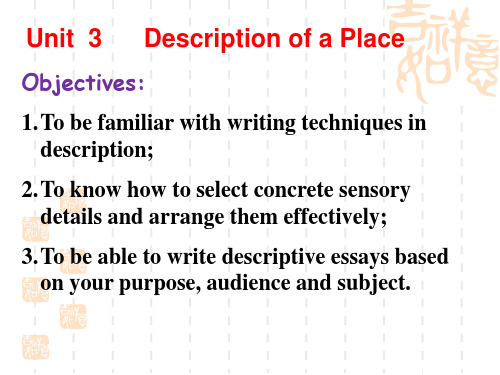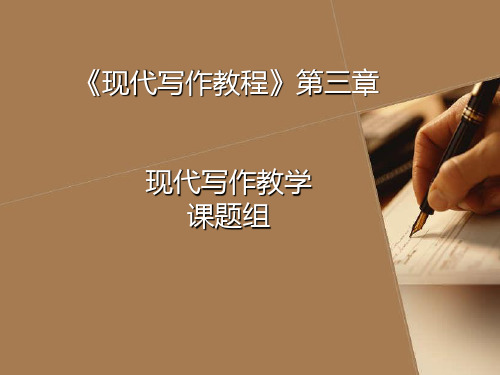写作教程第三册课件narration
NarrationPPT课件

sip
slurp gulp
jog sprint
wander stagger trudge
nibble
第10页/共32页
Main Sections to be Covered
5.1 Elements of Narrative Writing
Key Points
Research is a systematic process of inquiry consisting of three elements:
a Successful setting not just provides the physical background of the happening. It should also reveal the spiritual background such as the mood or atmosphere that reflects the event of the story.
related ones.
第2页/共32页
narration
Fiction: includes novels, plays and short
stories
Non-Fiction: bibliographies ,
autobiographies, feature stories and travel articles
第17页/共32页
15 - 17
1. This is a true story I just heard from a friend of mine over phone this morning, a story about the friend’s own daughter, a six grader, 12-year old girl, slim and sweet, always regarded as a bit spoilt “The Apple of the Eye” for the middle-class couple who live in Hanzhong, a small city in the southern part of Shan’xi province bordering Sichuan.
基础英语写作(三)PPT课件

• So the second factor is what happens to the individual—the sort of environment in which he is brought up. If an individual is in poor environment, it is likely that his brain will fail to develop and he will never attain the level of intelligence of which he is capable.
Part Three
The Paragraph
1
• A paragraph is a unit of thought; it is at once a unity in itself and part of a larger whole, that is, the essay.
• A paragraph is like a mini-essay; it should be unified, coherent and well developed.
7
Exercisesⅱ. Cross out the sentence that is not connected to
the topic of this paragraph:
• Books are placed on the library shelves in numerical order. In other words, all the books on one subject are put together under the same number; for example, all books on United States history are numbered 973, and are placed together on the 973 shelf or shelves. Of course, such books are borrowed mostly by students who learn history.
大学英语写作教程第三册unit--sentence-variety课件

The group of sentences in a paragraph should be regarded as a whole and should be different enough in types to avoid boredom. This is called sentence variety
The boys leaned against the willow tree (growing) next to the stream, their fishing poles resting on sticks, their eyes gazing at the bobbers on the ripples. The morning had been cool and comfortable, but the afternoon was becoming very hot. Both boys had taken great pleasure in planning for the trip on Friday, their only day off in the whole month.
n Conclusion: Sentences with different lengths are more desirable in writing.
18
9.1 Sentence Variety
n Follow-up activities: p144
n Reference for the Classroom Activities:
1 ) types of sentences:
英语写作教程第四讲

英语写作教程 English Writing Course Lecture 4. Narration第四讲:记叙文写作吉林化工学院外国语学院副教授:林罡请参考教材《英语写作基础教程(第三版)》第六章二零一三年六月Lecture 4 Narration (1)Prewriting: Free Writing (1)Activity: Freewriting about a memorable event or experience in your life (2)Part I. Organisation: Narration – Time Order (4)Time order words and phrases (5)Writing Practice One. Time Order Words (6)Writing Practice Two. Time Order Paragraph (8)Part II. Grammar and Mechanics – Simple Present Tense and Adverbs of Frequency (9)Simple Present Tenses (11)Position of Adverbs of Frequency (11)Practice 1: Simple Present Tense and Adverb Frequency (12)Comma Rules (15)Practice 2: Punctuation – comma rules (16)Writing Task 1: A Traditional Wedding (17)Part III. Sentence Structure: Compound Sentences (18)Questions on the model (19)Compound Sentences (19)Practice 3. Compound Sentences: with, and, or, but, so (20)Writing Task 2. Sentence Combining (22)Part IV The Writing Portfolio (24)STEP 1. Prewrite to get ideas (24)STEP 2. Organize the ideas (24)STEP 3. Write the Rough Draft. (24)STEP 4. Edit the Rough Draft (25)STEP 5. Write the Second Draft (26)STEP 6. Write the Final Draft. (26)Part V. Vocabulary to Enhance your Writing (26)Lecture 4 NarrationIn this lecture, you will concentrate on writing narration, a kind of writing in which you report events. In the first part of the lecture, you will write about an event or experience that happened to you in the past. In the second part, you will write about the traditional events of a wedding.Prewriting: Free WritingFreewriting is a way first to get and then to develop ideas. When you freewrite, you write “freely” – without stopping – on a topic for a specific amount of time. You just write down sentences as you think of them without worrying about whether your sentences are correct or not. Y ou also don’t have to punctuate sentences or capitalize words. Y ou can even write incomplete sentences or phrases. The main goal in freewriting is to keep your pencil moving across the paper.Now look at this student’s example of freewriting on the topic “A Memorable Even in my life”The student freewrote until he found a good topic: the earthquake. If he had wanted to, he could have done further freewriting about his earthquake experience to develop this topic.Activity: Freewriting about a memorable event or experience in yourlifeNow you try it. Freewrite about a memorable event or experience in your life. This might be a happy day, a sad event, an embarrassing moment, an interesting trip, or a frightening experience. Write for about ten minutes without stopping. If you find a topic during your freewriting, continue freewriting on that topic. If you already have a topic in mind before you start, freewrite on that topic for ten minutes to develop your ideas about it.Save your freewriting. You will use it later to write a paragraph in Part IV.Questions on the model1.How many time divisions are in the model essay? What are they?2.How many paragraphs are in the model essay? What time words or phrases begineach paragraph? Circle them.Part I. Organisation: Narration – Time OrderNarration is story writing. When you write a narrative paragraph or essay, you write about events in the order that they happened. In other words, you use time order to organize your sentences.In the model essay, the writer used time order to divide the essay into paragraphs. First, he wrote about what he and his family were doing just before the earthquake. Then he wrote about what happened during the earthquake. Next he wrote about what they did immediately after the earthquake. In the fourth paragraph, he wrote about his parents’ arrival home two hours later.An outline of the essay would look like this:I.Introduction: before the earthquakeII.Bodya)During the earthquakeb)After the earthquakec)Two hours after the earthquakeIII.ConclusionTime order words and phrasesTime order words and phrases are usually followed by a comma if they come at the beginning of a sentence. Then and now are usually not followed by a comma.Study the model essay, draw a circle around all of the time order words and phrases you find, and add any new ones to the list on the form above.Writing Practice One. Time Order WordsWriting Practice Two. Time Order ParagraphWrite the sentences from the proceding exercise as single paragraph. Try to make your paragraphs flow smoothly by using these three techniques:(1)Add time order words or phrases at the beginning of some of the sentences(2)Combine some of the sentences to form simple sentences with compound verbs(3)Change nouns to pronouns where possible.Part II. Grammar and Mechanics – Simple Present Tense and Adverbs of FrequencyAs you read the model essay, notice the verb tenses:Simple Present TensesPosition of Adverbs of FrequencyPractice 1: Simple Present Tense and Adverb FrequencyB. Choose a classmate from a different region from your own and ask each other questions about traditional weddings in your regions. Ask the following questions and other questions of your own. Use the simple present tense and different adverbs of frequency in your answers.1. When do wedding often take place in your region (eg. He Nan Province)?2. Do weddings usually take place in the morning?3. Do they ever take place at night?4. Where do they usually take place? Do they ever take place anywhere else?5. What colour id the bride’s dress? Is it always that colour?6. What else does the bride traditionally wear?7. What does the groom wear?8. Who sometimes cries at the wedding? Who rarely cries?9. Is there a party after the wedding?10. Where is the party usually held?11. What happens at the party?12. What kind of food and drinks are served?13. Are weddings expensive in your area?14. Who pays for wedding in your area?15. Do the couple often or seldom pay for their own wedding?Any other related questions are accepted.Comma RulesPractice 2: Punctuation – comma rulesWriting Task 1: A Traditional WeddingUse the answers of Practice 1-B, and write two paragraphs telling about a traditional wedding in a classmate’s region.Part III. Sentence Structure: Compound SentencesThe model for this section is a folktale. A folktale is a traditional story that had been passed down orally from one generation to the next until someone finally wrote it down. Every culture is rich in folktales. This one is from France.Questions on the model1.What kind of order does this folktale use?2.Underline the time words and phrases in the narration and add any new ones toyour list.Compound SentencesPractice 3. Compound Sentences: with, and, or, but, soA.Draw a circle around all of the coordinating conjunctions in the story aboutMonsieur Seguin’s Goat. Explain why some of them have commas, but others don’t.B.Decide which of the following are compound sentences and which are simplesentences. Write CS or SS in the space at the left. Then add commas to the compound sentences.Writing Task 2. Sentence CombiningPart IV The Writing PortfolioNow let’s complete the writing process you began at the beginning of this lecture. Write a composition of one or more paragraphs about a memorable event or a memorable experience in your life. Follow these steps to write a good composition.STEP 1. Prewrite to get ideasThis was the freewriting you did at the beginning of this Lecture.STEP 2. Organize the ideasPut the events into time order: make a list of the vents or number them on your freewriting paper. Use this list to guide you as you writeMake a list of ideas in the order that you will write about them. You will use this list to guide you as you write.STEP 3. Write the Rough Draft.Write SECOND DRAFT at the top of your WWJ (Weekly Writing Journal). Write the second draft of your composition. Then ask your partner to proofreading.STEP 6. Write the Final Draft.After your partner returns your composition, write a neat final copy to hand in for final evaluation. Write Final Draft at the top of your paper.Part V. Vocabulary to Enhance your WritingAid with your English-English dictionary to study the following pairs of words, and then write out the difference.1.normal – ordinaryI’m not looking for anything fancy, just a normal kettle.I’m just an ordinary person.2.Skin – complexionI got so sunburnt that my skin that my skin is peeling.Drinking a lot of water is good for the complexion.3.noticed – remarkedI’ve noticed that there are more butterflies this year.“You’re looking very well!” she remarked.4.office – studyReuters is a big agency with offices all over the world.I’ll have a bigger study in my new apartment.5.game – toyLet’s play a game of hide-and-seek.Alice got a new toy for her birthday.ck – needHis real problem is that he lacks confidence.We need an hour to get to the airport.7.wet – dampDon’t sit on that bench. The paint is still wet.You shouldn’t wear that shirt if it’s still damp. ANSWERS FOR LAST WEEK’S VOCABULARY STUDIES29。
实用职场英文写作教程Unit 3 Personal Statement25页PPT

从内容上讲,一篇好的个人陈述必须依次回答如下三个基本问题:你是什么样的人;你能给这份工作 职位带来什么益处;以及你对这份工作未来的目标是什么。除此之外,在有限的字数内,可适当添加 关于求职者自身的有价值的信息。 2. 从篇幅上看,一般个人陈述的字数应控制在50~150字以内,以100字左右为宜(可以的话使用1.5 倍行距,便于阅读)。一个好的个人陈述不仅要具备信息量,更要体现简明精炼,以显得申请者经过 慎重思考、概括写出的陈述,并非泛泛而谈。 3. 个人陈述中第一句话往往是最重要的。如果其内容并非雇佣者想要的,那么往往他们的阅读会戛 然而止。因此,必须好好利用第一句话的空间,以最有利的方式呈现出申请者的专业水准。 4. 关于个人陈述的人称使用,通常是第一人称“I”或者第三人称,也可以不出现人称代词或者人名, 因为阅读者知道所指是谁。切忌:①每句话都以人称代词“I”开头,给人以重复、繁冗、流水账的感 觉;②个人陈述中混杂使用第一人称和第三人称(实际上应该保持人称的一贯性)。 5. 在语言选择上,个人陈述的写作须注意如下三点:①避免使用口语化、俚语化等非正式语言;② 建议在介绍自己及个人职业经历经验时使用一些与专业、行业相关的术语,以显示求职者的专业知识 背景;③在描述自己能力、技能和个性时,所选择的形容词个数不必过多,1~3个为宜,且必须与所 申请的工作相关,最重要的是真实可信,切忌浮夸。 6. 由于篇幅不长,所需信息量大,具备良好的语言表达能力,组织好语言传达信息必然能体现申请 者的逻辑思维能力,因而,简单句或者短句在个人陈述中并不常见,建议求职者尽量使用逻辑性强的 复合句或者长句来写作。 7. 自己书写完毕后,反复阅读,再请亲戚、朋友或同学帮忙阅读,指出不完善之处。最终力求使得 个人陈述自然流畅,准确无误,不矫揉造作,不虚张夸大。
写作课 Unit 3 下载课件

9. The conclusion is a rephrasing or restatement of the opening paragraph. In this way, the writer gives cohesion to the whole passage.
Part two Writing Techniques
A brown squirrel hops merrily back and forth across branches of pine trees.
2. the smell of brownies baking in the oven
Байду номын сангаас
The aroma of tasty brownies baked in the oven made me mouth-watering.
5. The writer tells not just what he has seen, but also what he has heard (water drops “shattering the eerie silence”), has smelt (“the odor of something rotting”), has felt (“my sneakers soaking up the black water lying two inches deep on the floor”).
Audience:
The audience will also affect the detail selection, and so a writer should clearly identify his or her intended reader. How much the reader knows about the subject, how the reader feels about the subject, how interested the reader is in the subject——these factors can influence the choice of details.
现代写作教程-第三章PPT课件

.
32
(二)主题的作用
“人之所以不朽,不仅因为在所有生物中只有他才 能发出难以忍受的声音,而且因为他有灵魂,富于 同情心、自我牺牲精神和忍耐的精神。诗人、作家 的责任正是描写这种精神,他的光荣就是振奋人心, 提醒人们记住人类昔日的荣耀……诗人不应该单纯 地描写人的生命的编年史,他的作品应该成为支持 人、帮助他巍然挺立并取得胜利的基石和支柱。”
主题:惋惜之余鞭挞官僚作风和轻师抑教的世 俗之风。
.
12
结尾3:该教师因此被提拔为教育局长并成绩 斐然。
主题:只要是金子,在什么环境下都能闪光。 结尾4:该教师升官后却一事无成。
主题:作出成绩不一定当官,每一个人都有适 合他的位置。人尽其用,但更应人尽其才而用。
.
13
2.材料是表现主题的支柱。 杂诗 王维
.
5
2.分类
材料的特点
事实性材料:指客观存在的具体事物、具 体事实,包括人、事、物、景等
观念性材料:指在对社会生活观察实践后 逐步形成的观念、意识、看法等抽象的理 念,包括科学原理、定义、结论以及广为 流传的性质 材料的价值 材料的位置 材料的形态 材料的来源
正面材料
—— 福克纳
.
33
1.主题是文章的灵魂
⑴从主体角度说,通过主题表达某种确定的思想感 情,展现一定的精神风貌。 ⑵从载体角度说,通过主题使文章富有感染力,增 强文章的美学价值。 ⑶从受体角度说,通过主题使读者获得认同感,唤 起人类的普遍经验,引起共鸣。
.
34
2.主题为文章的统帅
“无论诗歌与长行文字,俱以意为主。意犹帅也, 无帅之兵,谓之乌合。李、杜所以称大家者,无 意之诗,十不得一、二也。”
.
21
写作教程3Unit2

PART 1 GRAMMARpronounsSubjective vs. objectiveReference for the Classroom Activities1). She has told me about it.2). -- Who is it?.It's me.3)That's him, I'm sure.4). It was she who solved the problem.(In this sentence, her is also acceptable though it is the subject of the relative clause. The only difference is in style, subjective pronouns sound more formal than objective pronouns. Two more examples:It was them who helped me out.It was me who did it. )5). Jill is the girl who I think went up the hill.(In the relative clause, who is the subject and the phrase I think is an explanatory parenthesis. )6). The Red Cross will accept whoever volunteers.( Whoever is the subject of volunteers. The clause whoever volunteers is the object of accept. )7). Who/Whom is it for?8).To whom is the letter addressed?Now, ask students to summarize the rules about the case of pronouns Summary:1.Subjective pronouns can be used as the subject or part of the predicate of asentence, while objective pronouns can be used as the object of either a verb or a preposition.2.Both subjective and objective pronouns can be used as part of a predicate and thedifference lies in style. If a subjective pronoun is used, it sounds formal and,therefore, is usually preferred in formal writing. If it is an objective pronoun that is used, it sounds colloquial and is, therefore, preferred in informal speech.3.Phrases like I think, I believe, I suppose, when inserted into a clause, do not affectthe roles of the other components in the clause.4.when the interrogative pronoun is not the first word of a question, standard usagehas not yet given up whom after a preposition or at the end of the question: For whom was the party given? You listened to whom? With whom did you go?However, popular usage gas been moving towards the elimination of whom,especially when it comes first in a question. Who is it for? Who did you meet?Who are you looking for?Singular vs. pluralReference for the Classroom Activities1). Someone left his or her umbrella on the train. (One person left one umbrella. )b. Everybody drove his own car to the camping site. (Each person got into his own car and drove it. )c. No one likes to be forced to do what he doesn't like. (Focus should remain on individual's freedom. )d. (correct) (Although everyone looks singular and is often followed by a singular verb,this sentence would be illogical if carried out in the singular: Everyone was in the classroom, but he has left to get pizza. )e. (correct) (A number of people left a number of raincoats. )Now, ask students to summarize the rules about the number of pronouns Summary:e a singular pronoun when the intent of the antecedent is singular. An indefinitepronoun, like someone, everyone, no one, and one, is usually considered to be singular and referred to with singular pronouns, but sometimes it is used in the plural sense and form.e a plural pronoun when the intent of the antecedent is plural.Point of viewReference for the Classroom ActivitiesRevised version 1:When people read about a natural disaster in another country, it hardly affects them. Of course, they feel bad and upset when people get killed. But as these disasters happen thousands of miles away from them and because they don't affect their own life, they are not traumatized by them. If a flood killed their own close friends, they would be more emotionally upset.Revised version 2:When we read about a natural disaster in another country, it hardly affects us. Of course, we feel bad and upset when people get killed. But as these disasters happen thousands of miles away from us and because they don't affect our own life, we aren't traumatized by them. If a flood killed our close friends, we would be more emotionally upset.Notice while the first version is comfortable and respectable, the second one involves the audience more effectively and directly because of the use of the pronoun we. The pronoun you can also achieve the same effect in this paragraph.Now, ask students to draw a conclusion from the activitySummary:One of the problems about the point of view is a careless shift from one subject to another within a sentence or from one sentence to the next. The solution is to rewrite the paragraph using a consistent presiding pronoun, or point of view.PARTⅡFOLLOW-UP EXERCISES1.1). In this excerpt, Liza's style is all but appropriate for the occasion. At thebeginning, she chooses a formal and affected style but later slides to colloquial and finally slang expressions. The other characters at the scene use general and colloquial vocabulary that is appropriate for the context.2).No. Here the obvious switch from a formal to a highly colloquial styleshows Liza in a transitional stage. She does not see that her learned comment on the weather is posed to be a lady and reverts to her natural speech, which incidentally is much more expressive and colorful than her phony(假冒的)formality(礼节).2. 1). play a minor role/be a utility man2). That's Greek to me.3). belated action/advice4). Where there is smoke there's fire.5). an evil creature6). walk into the trap7). one's face glowing with health3. 1). We must practice economy. / We must reduce unnecessary expenditures.2). It is essential to control environmental pollution.3). We must arrive at the station on time.4). Financial expenditures should be arranged in order of priority.5). We should speed up constructions of urban housing so as to improve thehousing condition.6). To be allowed to make profits, private capital has to meet two conditions:1) theprofits must be legal, and 2) they must not be excessive.7). During the period of the Tenth Five-Year Plan we must never neglect grainproduction. Instead, we must steadily increase it.4. Reference versionWomen's RightsIn feudal China, women had low social status, and were regarded as inferior to men. Thanks to the women's liberation movement, women have achieved equal status with men, which is established by the law. But in fact, they still can't enjoy equal rights with men.At home, wives are expected to do all the housework, which is obviously unfair. Husband and wife should share the housework and family responsibilities. But in some families husbands usually get angry when they find the cleaning or cooking unfinished by their wives. One can't help wondering why they don't do it by themselves.I think women should be spiritually and financially independent if they want real equality. In order to do that, they have to learn as much as men so as to find a good job. Appearance is no longer important to women. It is their ability that can bring them a good job rather than their appearance. So I think the best way for women to win more rights is to receive good education.5. 1). me 2). who 3). I 4). me/ myself 5). me 6). each other’s7). who 8).us 9). whom 10). some 11) one’s 12). his13). his 14). his, his6 1). We are all born into this world as equals, but for various reasons, not all ofus are treated as equals. This inequality begins when we reach the age of five, for this is when we will enter elementary school. In school, we are no longer "Mommy's little darling." We now have to prove ourselves to the other children and also to our teacher. If we seem different from the other students, we are treated differently, and these differences could be anything: pants, shoes, speech, religion, and so forth. Right from the start, we think that as long as we are different, there is something wrong with us.2). There are those who assume that since I can't see, I obviously cannot hear.Very often people will talk with me at the top of their lungs, uttering each word very carefully. On the other hand, people will also often whisper, assuming that since my eyes don't work, my ears don't either. For example, when I go to the airport and ask the ticket agent for assistance to the plane, he or she will invariably pick up the phone, call a ground hostess and whisper: "Hi, Jane, we've got a 76 here." I have concluded that the word "blind" is not used for one of two reasons: either they fear that if the dread word is spoken, the ticket agent's retina will detach, or they are reluctant to inform me of my condition of which I may not have been previously aware.。
Narration 记叙文的写作要点(课堂PPT)

Step4.Ognization
• Chronological order • In the order in which things occur • Flashback • To arouse reader`s interest
20
Step5.Outline
• A beginning • The setting • A middle • The body tells the story itself • An end
Setting Plot
Characterization Atmosphere
Conflict Point of View 9
1.1 Setting 背景 • The time and place in which the
events of a story take place . Cultural ,social , physical context of a story.
15
What should you consider when planning a narrative?
Theme 主题
Symbol 象征
Point of view 视角
Text
Foreshadowing伏笔
Setting 背景
Plot 情节
Order 顺序
16
Step1.Context
• At the beginning of a narrative ,make clear:
21
Thank You!
22
6
Two Types of Narration
Expository narrative
is the factual account of events, including history, biography, travels, news reports and journals.
新时代核心英语教程写作3教学课件unit2

The structure and format
The structure and format
Every well-constructed social letter is made up of five essential parts. • the heading • the salutation • the body • the complimentary close • the signature
ore
新时代
urriculum 核心英语教程
3 写 作
2 UNIT
Letters and notes for social purposes
Key Terms
block style 齐头式 complimentary close 结尾敬辞 heading 信头 indented style 缩进式
The salutation
The following salutations are arranged in order of increasing intimacy.
The salutation
The following salutations are arranged in order of increasing intimacy.
2. It is written to add extra information to the letter, or sometimes it is planned to bring emphasis to some important information.
The postscript
You can sign a postscript with your first name or the initials of your full name, or you can just leave out the signature.
《语文习作三》课件

本次PPT课件旨在帮助学生深入理解与掌握语文习作三的技巧和方法。
作文主题选择
个人经历
如何从自己的人生经历中寻找灵 感,写出独特有感触的文章?
社会点
如何从身边的社会热点事件中找 到新闻价值,在文章中展现自己 的关注与看法?
名言警句
如何从名人名言、诗词经典中汲 取灵感,写出富有哲理的文章?
常见错误及提高写作的方法
1
常见错误
如何避免拼写、标点符号等基本错误,
提高写作的方法
2
打磨好文章质量?
如何多读、多写、多思考,不断提升自
己的语感和写作水平?
3
学习他人优秀作品
如何借鉴他人的学术创作,迸发自己的 创作灵感?
结束语
学习成果
希望这次的学习,能帮助同学们 提高写作技巧,有所收获。
持续实践
语文习作需要不断地实践,不断 地提高。希望同学们不断精进, 写出更多优秀作品。
文章结构
开头
如何抓住读者的注意力,引 入文段主题?
中间
如何分段,结构清晰地阐述 自己的观点,同时吸引读者 关注?
结尾
如何对全文进行总结,给人 留下深刻的印象?
写作技巧
用词
如何选择精准的词汇,强化表 达效果?
句法
如何灵活运用各种语法结构, 营造节奏感和氛围?
修辞
如何善用比喻、夸张等修辞手 法,丰富文章表现力?
创新思维
发掘自己的与众不同之处,用创 新思维写出富有表现力的优秀作 品。
英语写作基础教程3新 PPT

learning method:
1)多读英文原文:多读什么样的文章呢?一是我们教 材中选的短文(新版教材提供了更多英文短文);二 是英美文学作品中的短文。 2)多做“模拟写作”:在我们学习英文写作的初级阶 段,建议同学们注意运用“模拟写作”这个方法,参 照同类体裁的范文,谋篇布局和行文的借鉴作用。
可以互相讨论下,但要小声点
教学目的
本课程的教学目的是培养学生初步掌握英语写作 的能力, 学会用英文写叙述文、说明性的短文和 一般性应用文。具体要求:
(1)要求学生能根据命题列出写作提纲,在约1 小时内写出不少于200词的短文, 并做到内容切题、 完整,条理清楚,语句连贯通顺, 语法基本正确。
(2)要求学生能根据提示写出通知、贺卡、便 条、申请书、邀请函、简历等, 并做到格式正确, 语言得体。
书本中的练习设计更加生动活泼针对性更本课程的教学目的是培养学生初步掌握英语写作的能力学会用英文写叙述文说明性的短文和1要求学生能根据命题列出写作提纲在约1小时内写出不少于200词的短文并做到内容切题完整条理清楚语句连贯通顺语法基本正确
英语写作基础教程3新
A Basic Course in Writing 英语写作基础教程
教材介绍
《英语写作基础教程》用清晰、浅易的英语写成, 宗旨是帮助学生掌握英语写作的基本知识和基本 技巧,提高英语写作水平。与同类书相比,本书突 出了实用和多举范例的特点,所选范文既有英、 美作家的作品,又有中国学生的习作,易于学习模 仿。书本中的练习设计更加生动活泼,针对性更 强。
大家有疑问的,可以询问和交流
- 1、下载文档前请自行甄别文档内容的完整性,平台不提供额外的编辑、内容补充、找答案等附加服务。
- 2、"仅部分预览"的文档,不可在线预览部分如存在完整性等问题,可反馈申请退款(可完整预览的文档不适用该条件!)。
- 3、如文档侵犯您的权益,请联系客服反馈,我们会尽快为您处理(人工客服工作时间:9:00-18:30)。
Good sentences
5. Inland university and university abroad have much difference in academic atmosphere, education system and ways of cultivating students.
Work review
Good sentences
1. Many Chinese youth of today are addicted to computer games, which do great harm their physical and mental health. 2.Travel plays an important role in developing our country: boosting the economy and promoting cultural communication with other countries. 4. With the development of economy, travel abroad has become a tendency. There are 3 reasons why Chinese people like traveling abroad.
1. They may have decided that the young people were of a lower class or undesirable ethnic group, and thus disdain to answer the door. 2. In the narration, character is probably the least important since the fourth young people are not extensively delineated or described.
Weak sentences
1. There are three points of why travel become so popular now: Development of economy, work pressure, Development of traffic. 2. Traveling is benefit for our life which can reduce pressure and make friends with different people. 3. The Chinese youth of today is full of pressure: study, the high price of the building, car and oil 4. University plays an important role in cultivating college students, helps them gain more professional knowledge, enhances personal personality.
3. Despite their honest efforts to succeed, young and poor people are often met with indifference from those who are older or well-to-do.
Narration
First person/ third person
Weak sentences
9. Chinese university calls for more justice in management with a system of sounder supervision and more self-disciplined teachers so as to create a harmonious teaching environment.
“Well, young man, how old were your parents when they died?” “Mother was ninety-three, and she died from a fall off her bicycle. Father was ninetyeight and he died while he was playing football.” The manager immediately agreed to insure the man’s life.
“Well, young man, how old were your parents when they died?” “Mother was ninety-three, and she died from a fall off her bicycle. Father was ninetyeight and he died while he was playing football.” The manager immediately agreed to insure the man’s life.
Contents--1
1 2
3 4
Definition classification basic elements
details and theme
The Insurance Office
A man went to an insurance office to have his life insured. The manager of the office asked him how old his parents were when they died. “Mother had a bad heart and died at the age of thirty. Father died of tuberculosis when he was thirty-five.” “I am very sorry,” said the manager, “we cannot insure your life as your parents were not healthy.” As the man was leaving the office, depressed, he met a clerk, who had overheard the conversation.
7. The difference between Chinese university and western university: teaching methods, managing methods, study atmosphere.
8. The Chinese youth of today have three advantages: being full of passion, having confidence about themselves and being brave to challenge.
“You must not be so frank and tell the truth,” said the clerk. “No office will insure you if you speak like that. Use your imagination a little.” The man went to another office and was shown into the manager’s room.
6. Travelling abroad needs great environmental supports.
7. What impress me most on this trip are local culture and delicacy of Xia Men.
Good sentences
1
What is narration?
Definition
To narrate is to give an account of an event or a series of events. Narration is a process by which events or actions are presented to the reader in a particular order. (OE P5; NE P4)At its simplest, narration is the telling of a story, which involves characters and ongoing actions or events.
Weak sentences
5. Chinese modern travel causes many problems: environmental pollution, cheating tourists and safety problems. 6.There are many problems of facilities in ECJTU which the school authority should deal with
